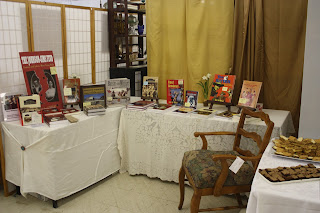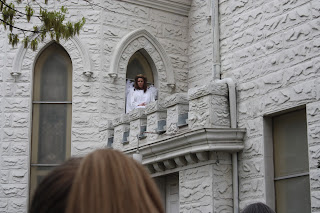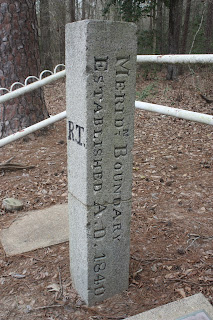"Lone Star Historian" is a blog about the travels and activities of the State Historian of Texas. Bill O'Neal was appointed to a two-year term by Gov. Rick Perry on August 22, 2012, at an impressive ceremony in the State Capitol. Bill is headquartered at Panola College (www.panola.edu) in Carthage, where he has taught since 1970. For more than 20 years Bill conducted the state's first Traveling Texas History class, a three-hour credit course which featured a 2,100-mile itinerary. In 2000 he was awarded a Piper Professorship, and in 2012 he received the Lifetime Achievement Award from the Wild West Historical Association. Bill has published almost 40 books, half about Texas history subjects, and in 2007 he was named Best Living Non-Fiction Writer by True West Magazine.
 |
| I was introduced to the Shelby County Historical Society by a former student, Shana Brittain. |
 |
| Shana Brittain brought several of her Center High School students to the book signing on the square. |
Two days later I returned to Center. Ann Bowen, an officer of the Shelby County Historical Society, owns and manages an antique mall and had advertised a book signing schedule from 10 AM to 1 PM, featuring my two new titles, West Texas Cattle Kingdom and Lampasas, 1855-1895, Biography of a Frontier Texas Town. There was an excellent turnout which included a number of my former students, and the three-hour signing turned into four hours.

Two days later, on Saturday, my wife Karon and I drove toward Austin, with a stop in Corsicana to see the Easter cycle play which I described in the previous blog. A crowd of more than 300 followed the "cycle" from one church to another, and a large chorus and instrumentalists maintained the mood of the pageant as we moved to different stations. The scenes were carried off with imagination and power, and I learned that on the next day, Palm Sunday, the crowd was even larger.
 |
| Bob Bullock Texas State History Museum |
 My wife and I spent Saturday night at the Stagecoach Inn in historic Salado. I was scheduled to speak at the Bob Bullock Texas State History Museum early Sunday afternoon. We arrived with time to spare. I checked in at the gift shop, which had planned a signing for my most recent book, West Texas Cattle Kingdom. Esther Rivera of the museum staff took me to the Texas Spirit Theater for a sound check with the technicians. As the audience arrived I greeted as many as possible, expressing my appreciation for their attendance. I was delighted to see a former student, Wade Parsons, who had brought his family. My oldest daughter, Lynn Martinez, a teacher in the Mansfield ISD, also was present with her family, husband Rudy and daughters Chloe and Jessie. Lynn had hoped for years to bring her daughters to the Bob Bullock Museum, and I was proud that they were able to coordinate the museum visit with my appearance. I was introduced by the museum director, Joan Marshall, who had invited me to prepare an address on "The Leadership Roles of Sam Houston." I relished this assignment, and the audience seemed quite receptive. There was a brisk book signing afterward, and I was deeply privileged to have been asked to provide an event at the flagship museum of Texas History.
My wife and I spent Saturday night at the Stagecoach Inn in historic Salado. I was scheduled to speak at the Bob Bullock Texas State History Museum early Sunday afternoon. We arrived with time to spare. I checked in at the gift shop, which had planned a signing for my most recent book, West Texas Cattle Kingdom. Esther Rivera of the museum staff took me to the Texas Spirit Theater for a sound check with the technicians. As the audience arrived I greeted as many as possible, expressing my appreciation for their attendance. I was delighted to see a former student, Wade Parsons, who had brought his family. My oldest daughter, Lynn Martinez, a teacher in the Mansfield ISD, also was present with her family, husband Rudy and daughters Chloe and Jessie. Lynn had hoped for years to bring her daughters to the Bob Bullock Museum, and I was proud that they were able to coordinate the museum visit with my appearance. I was introduced by the museum director, Joan Marshall, who had invited me to prepare an address on "The Leadership Roles of Sam Houston." I relished this assignment, and the audience seemed quite receptive. There was a brisk book signing afterward, and I was deeply privileged to have been asked to provide an event at the flagship museum of Texas History.
The following evening I again was in Center to provide a program for the Capt. Jesse Amason Camp, #282, of the Sons of Confederate Veterans. There are 80 camps, or companies, of the Texas Division of the SCV. Three of my great-grandfathers defended their homes - in Georgia, Mississippi, and Alabama - as youthful soldiers of the Confederacy, and they each migrated to Texas after the Civil War. I had met with the Center SCV on past occasions, and it was a pleasant evening for me. As I drove home afterward, I reflected on what a busy and rewarding week it had been, full of State Historian activities, with more around the corner.



































